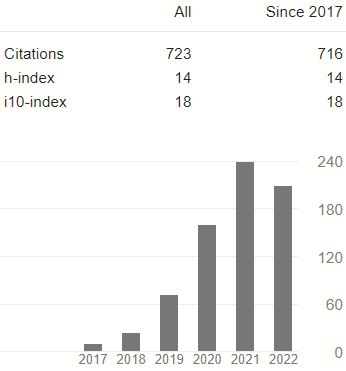PENGARUH KARAKTERISTIK INDIVIDU DAN PELATIHAN TERHADAP PEMAHAMAHAN SAK ETAP
Studi Empiris Pada Koperasi di Kabupaten Pati
DOI:
https://doi.org/10.25170/jara.v13i1.486Keywords:
Individual characteristics, pelatihan, SAK ETAP, koperasiAbstract
The use of Financial Accounting Standards Entity without Public Accountability (SAK ETAP) has been launched starting in 2011, although there is still relatively little research on the topic of understanding SAK ETAP. Research on the use of previous SAK ETAP is more inclined to case studies in a particular SME. Cooperatives must make a financial report annually as a form of accountability Board to member. The understanding of accounting employees about SAK ETAP is important because accounting employees are responsible for financial reporting. Therefore, this research needs to be done to know how far the understanding of the accounting section of SAK ETAP.This study aims to analyze the factors that effect on the understanding of the economic enterprise accountants of SAK ETAP. These factors include level of education, educational background, SAK ETAP training, and gender. This study used data obtained from the questionnaire where the respondents were a cooperative accounting officer located in the Pati District. Respondents amounted to 80 who became the sample of the study. The sampling method study was used convenience sampling. The data analysis tool used is multiple regression analysis. The results showed that education level, educational background, and training of SAK ETAP influenced the understanding of SAK ETAP. The higher the level of education, the ability to understand the SAK ETAP is also high. Employees who have an accounting education background were easier to understand SAK ETAP than non accounting education. In addition, SAK ETAP training can also improve employees' ability to understand SAK ETAP. However, gender has no influence in determining the level of understanding of SAK ETAP.
References
Ajzen, I.(2006). Theory of planned behavior. Http://people.umass.edu/aizen/tpb.html, diunduh17 September 2016.
Aufar, A.(2014). Faktor-faktor yang mempengaruhi penggunaan informasi akuntansi pada UMKM (Survei pada perusahaan rekanan PT PLN (Persero) di Kota Bandung). Bandung: Universitas Widyatama.
Dinas Koperasi dan UMKM Provinsi Jawa Tengah. (2016). Rekapitulasi keragaan koperasi kabupaten/kota di provinsi Jawa Tengah 31 Desember 2016.
Dinas Koperasi dan UMKM Kabupaten Pati.(2015). Data base koperasi tiwulan IV tahun 2015. Pati.
Fakih. (2001). Analisis gender dan transformasi sosial. Yogyakarta: Pustaka Pelajar.
Ghozali, I.(2011). Aplikasi analisis multivariate dengan program IBM SPSS 19. Semarang: Badan Penerbit Universitas Diponegoro.
Ghozali, I.,&Ratmono,D.(2013). Analisis multivariat dan ekonometrika teori, konsep, dan aplikasi dengan Eviews 8. Semarang: Badan Penerbit Universitas Diponegoro.
Gray, C. (2006). Absorptive capacity, knowledge management and innovation in entrepreneurial small firms. International Journal of Entrepreneurial Behaviour & Research, 12 (6), 345-360.
Ikatan Akuntan Indonesia. (2009). Standar akuntansi keuangan entitas tanpa akuntabilitas publik. Jakarta: Dewan Standar Akuntansi Keuangan.
Kementerian Koperasi dan UMKM Republik Indonesia. (2015). Rekapitulasi data berdasarkan provinsi 31 Desember 2015. www.depkop.go.id, diunduh pada 16 September 2016.
Kholis, I.K. (2014). Tingkat pendidikan, skala usaha, pengalaman usaha dan masa jabatan berpengaruh terhadap penerapan laporan informasi akuntansi pada usaha kecil menengah (Studi kasus pada UKM tepung tapioka di Desa Ngemplak Kidul Kecamatan Margoyoso Kabupaten Pati). Semarang: Universitas Dian Nuswantoro.
Minarni,E. &Sisdiyantoro,K. (2014). Faktor-faktor yang mempengaruhi implementasi standar akuntansi keuangan entitas tanpa akuntabilitas publik (Studi empiris pada koperasi di Kabupaten Tulungangung.Jurnal BONOROWO, 2(1).
Niken,S.K., & Sudarno.(2014). Analisis pengalaman pra komite audit terhadap pendeteksian kecurangan pelaporan keuangan.Diponegoro Journal of Accounting, 3 (3), 1-10.
Prima,P.Q. & Rohman, A. (2012). Analisis faktor-faktor yang mempengaruhi kualitas audit aparat inspektorat kota/kabupaten di Jawa Tengah. Diponegoro Journal of Accounting,1(2),1-12.
Radina, E.S., &Cahyonowati,N. (2015). Analisis pengaruh aspek demografi, status sosial ekonomi dan pengalaman kerja terhadap persepsi etis mahasiswa akuntansi dengan love of money sebagai variabel intervening.Diponegoro Journal of Accounting,4 (2),1-15.
Rudiantoro, R.S. & Siregar, S.V. (2012). Kualitas laporan keuangan UMKM serta prospek implementasi SAK ETAP. Jurnal Akuntansi dan Keuangan Indonesia, 9 (1).
Sabrina &Januarti,I. (2012). Pengaruh pengalaman, keahlian, situasi audit, etika dan gender terhadap ketepatan pemberian opini auditor melalui skeptisisme profesional auditor.Simposium Nasional Akuntansi XV, Banjarmasin.
Sariningtyas, P., &Diah,W.T. (2011). Standar akuntansi keuangan entitas tanpa akuntabilitas publik pada usaha kecil dan menengah.Jurnal Akuntansi dan Keuangan Indonesia,1(1),90-101.
Solovida, G.T. (2003). Analisis faktor-faktor yang mempengaruhi penyiapan dan penggunaan informasi akuntansi pada pengusaha kecil dan menengah di Jawa Tengah.” Tesis, Universitas Diponegoro.
Susanto, B.&Yuliani, N.L. (2015). Prospek implementasi SAK ETAP berbasis kualitas laporan keuangan UMKM. Magelang: Universitas Muhammadiyah Magelang.
Tuti, R.,&Dwijayanti, S.P.F. (2014). Faktor-faktor yang mempengaruhi pemahaman UMKM dalam menyusun laporan keuangan berdasarkan SAK ETAP. The 7th NCFB and doctoral colloquium 2014 towards a New Indonesia Business Architecture. Business and economic transformation towards AEC 2015. Surabaya: Universitas Katolik Widya Mandala Surabaya.
Van Hemert, P., E. Masurel, &P. Nijkamp. (2011). The role of knowledge sources of SME’s for innovation perception and regional innovation policy. Working paper. http://dare.ubvu.vu.nl/ bitstream/1871/24072/1/rm%202011- 39.pdf.
Wicaksono, A.L. (2016). Analisis faktor-faktor yang mempengaruhi persepsi pelaku usaha mikro kecil menengah tentang pentingnya pelaporan keuangan berdasarkan SAK ETAP (Studi empiris pada UMKM di Kabupaten Jember). Jember: Universitas Jember.
Downloads
Published
Issue
Section
License
Authors who publish with this journal agree to the following terms:
- Authors retain copyright and grant the journal right of first publication with the work simultaneously licensed under a Creative Commons Attribution-ShareAlike 4.0 International License that allows others to share the work with an acknowledgment of the work's authorship and initial publication in this journal.
- Authors are able to enter into separate, additional contractual arrangements for the non-exclusive distribution of the journal's published version of the work (e.g., post it to an institutional repository or publish it in a book), with an acknowledgment of its initial publication in this journal.
- Authors are permitted and encouraged to post their work online (e.g., in institutional repositories or on their website) prior to and during the submission process, as it can lead to productive exchanges, as well as earlier and greater citation of published work.














